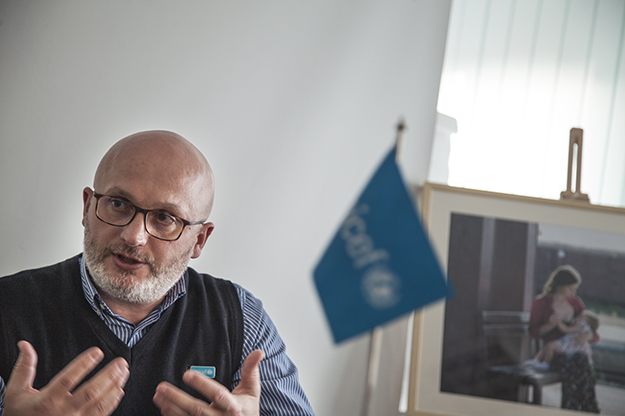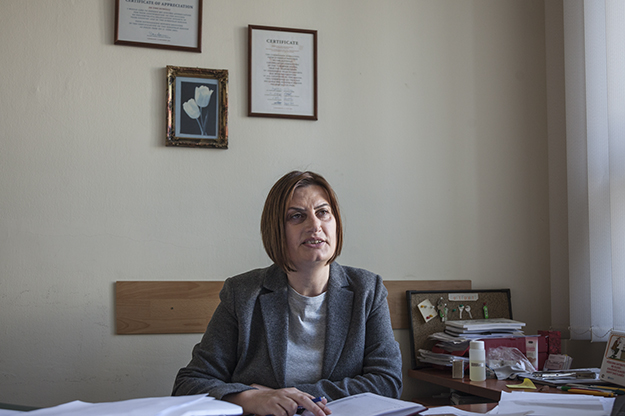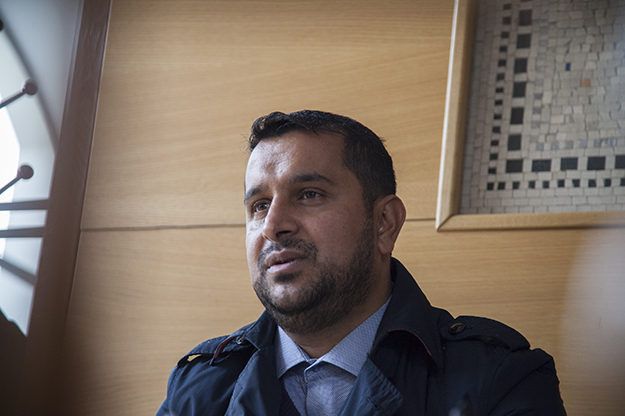On October 11, residents of Fushe Kosove’s neighborhoods 28 and 29 were both alarmed and distressed. That morning, they woke up with the tragic news of the death of a 15-month-old baby; it was presumed that the death was caused by measles. According to local people, that month measles also caused a young woman to suddenly have a miscarriage.
For inhabitants of the two neighborhoods there was a sense of hopelessness in terms of keeping their children, who were exposed to the danger, safe.
Just five days later, another death was reported. This time a 37-year-old man from Lipjan died. He was reportedly diagnosed with measles and had earlier suffered severe respiratory problems.
In some households, every member of the household caught the highly contagious infection.
When the Infective Clinic of Kosovo’s public hospital announced that there was a wider measles outbreak that by now saw over 100 persons lying in the hospital, the whole society became alarmed: The last recorded cases of measles in Kosovo had been 17 years ago.
Suddenly, dozens of people were developing a cough, fever, red eyes, a runny nose, muscle aches and white spots inside the mouth, which ultimately culminates in the widespread skin rash that most people associate with measles.
As happens with measles outbreaks, the virus passed from one person to another, sometimes through direct contact, but also through the air; as the infected particles enter the air and settle on surfaces, anyone within close proximity can become infected. In some households, every member of the household caught the highly contagious infection.
As the clinic’s officials reported that the majority of victims infected by measles were small Roma, Ashkali or Egyptian children, all eyes were directed toward Fushe Kosove, which saw the biggest number of residents flowing into the emergency room.
Neighborhood suffering
Taking the left turn from the roundabout in front of Fushe Kosove’s railway station leads to the town’s neighborhoods 28 and 29. Divided by the rails and forgotten old trains, it is rare to see someone who isn’t Roma, Ashkali or Egyptian in these parts, besides a tiny number of people from other communities who live there. Although, according to the inhabitants, the overpopulated area contains around 5,000 people, public life is limited to a few under-furnished corner shops.
The distance from Fushe Kosove’s town center is not more than a mere kilometer, but as you enter the neighborhoods sharp images of poverty immediately confirm the social exclusion from the rest of the municipality.
With a high unemployment rate and average incomes of just 21.37 euros per month for an individual, or 71 cents per day, similarly with Roma, Ashkalis and Egyptians in other parts of Kosovo, life in the two neighborhoods is a constant struggle to ensure basic needs. For the majority of households, ensuring there is bread to eat means doing daily physical labor, and going out in the streets to collect bottles in the garbage, which in turn they sell for recycling for just a few euros.
The already harsh daily routine became an even more turbulent one when measles found them unimmunized and unvaccinated. But amongst the sense of chaos, it became clear that a massive issue had been long neglected: Roma, Ashkali and Egyptian children are rarely vaccinated. Activists say that hundreds of cases were witnessed in Fushe Kosove, but there is no recorded number as many didn’t go to the hospital.
A worldwide issue
Measles remains one of the leading causes of death among young children globally, despite the availability of a safe and effective vaccine. According to the World Health Organization, approximately 89,780 people died from measles in 2016 – mostly children under the age of 5.
The majority of deaths occur in Africa and Asia, but more recently Europe has not been spared. Ongoing measles outbreaks in the WHO European region have caused 35 deaths since the beginning of 2016.
The most recent fatality was a 6-year-old boy in Italy. Several other countries have also reported outbreaks. According to national public health authorities, these have caused 31 deaths in Romania, one death in Germany and another in Portugal.
According to reports, the Kosovar National Institute of Public Health was warned earlier this year that there was an ongoing measles outbreak in Europe. The World Health Organization (WHO) continuously highlights that vaccination remains crucial to stopping the spread.
The issue of non-vaccination among Roma, Ashkali and Egyptian communities was particularly highlighted a couple of years ago in the Kosovo Multiple Indicator Cluster Survey (MICS) developed by UNICEF as a household survey program to collect internationally comparable data on a wide range of indicators on the situation of children and women. In Kosovo it was carried out in 2013-14 by the Kosovo Agency of Statistics.
Agron Gashi, from UNICEF Kosovo, explains how there is an evident disparity between Roma, Ashkali and Egyptian communities and other communities in the country. He says that MICS showed that while approximately 80 percent of children in Kosovo are vaccinated, the percentage drops to under 30 percent when it comes to Roma, Ashkali and Egyptian children.
MICS also showed child mortality is much higher in the three communities: 49 out of every 1,000 children die between birth and the fifth birthday — three times more than in other communities. “There is no trend of mortality decline of children of Roma, Ashkali and Egyptian communities,” Gashi says.
Despite the alarming statistics, international bodies such as UNICEF have praised the immunization program in Kosovo, where a legally obligatory vaccination is provided for free — the Ministry of Health supports the supply of vaccines.

Agron Gashi from UNICEF says that while approximately 80 percent of children in Kosovo are vaccinated, the percentage drops to under 30 percent when it comes to Roma, Ashkali and Egyptian children. Photo: Majlinda Hoxha / K2.0.
Isme Humolli, from the National Institute of Public Health, says that every parent or legal guardian is also given a vaccination card, called an “immunization passport,” detailing what vaccinations are required and when. “When the childcarer goes to the vaccination centers, the mother is equipped with the immunization passport, which he/she is obliged to keep for their whole life,” Humolli says. “In this context, the health of the child is tracked from the moment of birth until he/she is 18 years old.”
An existential struggle
So with such a program in place, why have so many Roma, Ashkali and Egyptian children not been vaccinated against measles?
Humolli says that the constant movement of Roma, Ashkali and Egyptian communities from one town to another makes it difficult to keep track of the non-vaccinated children. She adds that it is particularly problematic with the communities living in the Serb parallel system, as they don’t access the Kosovar health system.

Isme Humolli, from the National Institute of Public Health, says that government efforts to vaccinate children in Roman, Ashkali and Egyptian communities have been met with resistance. Photo: Majlinda Hoxha / K2.0.
According to Humolli, efforts by the Ministry of Health, the Institute and health care centers have been met with resistance from the communities.
“Over the years, there were efforts to enter the houses of this community for vaccination from the health care centers. But unfortunately it didn’t happen. Because they didn’t want it to,” Humolli says. “Until the outbreak happened there was no collaboration with them. It is the communities that resisted the collaboration.”
Activists working on the ground in Fushe Kosove agree that there have been times when vaccination teams would come to NGOs working with communities, but just a few had brought their children along to be immunized.
But they insist that the reasons for this are many and varied, in contrast with the simplified answer of “lack of awareness” that was provided by much of the mainstream media coverage during the outbreak. While on the one hand, they accept that some parents have been afraid of the side effects of vaccination or have believed gossip that vaccines are outdated, they highlight that the most important factor is many families’ constant existential struggle.
“When somebody has problems, and is obliged to go out and work … just to ensure they have bread, one forgets the vaccination date.”
Hysni Hasani, The Ideas Partnership
Gashi points out that while there is a tendency for Roma, Ashkali and Egyptian newborns to receive the BCG vaccine (against tuberculosis), the rate of later immunizations — such as Measles, Mumps and Rubella (MMR), which is usually given when a baby is between 12 and 15 months of age — drops off.
“If we analyze in detail, we will see that the rate of BCG vaccination given at birth or in the first year is much higher, and then [the rate of other vaccines] starts to decline,” says UNICEF’s Gashi, adding how lack of awareness comes as a result of poor conditions and low education among the Roma, Ashkali and Egyptian communities.
For activists, communities that struggle for basic needs in their daily life, vaccinations don’t come as a priority.
“When somebody has problems, and is obliged to go out and work … just to ensure they have bread, one forgets the vaccination date,” says Hysni Hasani from The Ideas Partnership, a Fushe Kosove based NGO that focuses on education of minority communities. “I know my community. It is not that they do not want to do something. But they are forced to forget the date. Life is full of burdens here.”
During the recent measles outbreak, Hasani was one of the activists from the organization that supported the majority of the families who needed transport to hospital. They also collected funds for the families who were unable to pay for the drips and medicine prescribed for the children at the hospital, as the inadequate public health care institution sufferers from a lack of equipment.
“We at The Ideas Partnership are in daily contact with the the families here. The first ones that got affected and the one that experienced the death of the child live in very very grave conditions,” Hasani says. “We are talking about people who go out every day to collect garbage in order to survive. No one goes out to do that out of pleasure. Over the years we have witnessed cases of people suffering from respiratory diseases. Imagine how sad it is for some to spend the whole day in front of the garbage and inhale that air, particularly during the hot summers.”
According to Hasani and other activists, extensive water cuts and the long time spent in front of the garbage combined to provide a fertile environment for the spread of the disease. Many families don’t have water pumped into their homes, while activists say that just a few families can afford wells in their yards.
In fact, a lot of research links poverty and disease in an ongoing, vicious relationship. The infection rates of diseases are proven to be highest in places where poverty is rife.
"Ultimately, as a state, as a society — the Kosovar society — we need to ask ourselves: Are we all guilty?"
Gazmen Salijevic, ECMI
While global measles deaths have drastically decreased in recent years, according to WHO measles is still common in many developing countries. The overwhelming majority of measles deaths occur in countries with low per capita incomes and weak health infrastructures.
WHO also highlights that severe measles is more likely among poorly nourished young children; 15 percent of Roma, Ashkali and Egyptian children under five in Kosovo suffer from chronic malnutrition, and this number increases to 25 percent amongst children from the poorest families.
Collective guilt
Recent weeks have seen a huge mobilization of vaccination teams in the neighborhoods largely inhabited by Roma, Ashkali and Egyptians with hundreds of children being vaccinated. Rahmon Stollaku, from Balkan Sunflowers, an NGO that works with minority communities, believes that while vaccinations might not be so much of a problem in the future, institutions need to improve the overall impoverished situation of the communities.
“I would blame the municipality’s policies,” he said. “They need to think to take steps about this. Because 99 percent here in Fushe Kosove are jobless, while [Roman, Ashkali and Egyptians] make up 13 percent of the municipality’s population.”
It is estimated that the large majority of Roma, Ashkali and Egyptians are unemployed, while the burden of providing the income often falls upon children. But despite the government having had strategies for improving the integration of these communities since 2010, there has been no evidence that action has been taken to improve lives.
Gazmen Salijevic, a program coordinator at the European Center for Minority Issues (ECMI), says that institutions need to change their neglectful approach toward the communities as the virus is just a small dot in a bigger picture.
“They need to think how the people can live better,” he says. “Vaccination is one thing. But what about tomorrow? What about after two years? How they are they going to change lives and reduce poverty?

Gazmen Salijevic from ECMI says that Kosovar society needs to have a national debate on the treatment of Roma, Ashkali and Egyptian communities. Photo: Majlinda Hoxha / K2.0.
He points out that there have been shocking events in the past that should have triggered action, but still little progress has been made.
“We have the case a couple of years ago in Fushe Kosove, when dogs killed an Ashkali kid and we still didn’t wake up,” he says. “This happened next to the garbage bins and a family lost their loved one. If this happened in Switzerland, this would have turned into a national debate about why this is happening. There isn’t a systemic reaction from the state to change lives. I see it often that the reaction doesn’t have emotion because they say, ‘Ah it is a Roma, or an Ashkali.’”
Salijevic says that instead of pointing the finger for the virus outbreak, Kosovars all have cause to reflect when it comes to treatment of the Roma, Ashkali and Egyptian communities.
“It’s very easy to address who is the guilty one. And point out the parents,” Salijevic says. “All of us are to blame because we lost a baby, a human being, a life. And ultimately, as a state, as a society — the Kosovar society — we need to ask ourselves: Are we all guilty?”K
K2.0 contacted the Ministry of Health in order to ask more precisely what policies are in place to tackle the health issues of Roma, Ashkali and Egyptian communities. The communication office directed K2.0 to contact the Health Institute and when K2.0 insisted to also interview the Ministry, they didn’t reply further.
Feature image: Majlinda Hoxha / K2.0.
The content of this article are the sole responsibility of the ERAC and can in no way be taken to reflect the views of European Union. For more information regarding the ERAC project activities, please visit ERAC webpage www.equalrightsforallcoalition.com or go to the Facebook page Equal Rights for all Coalition.







